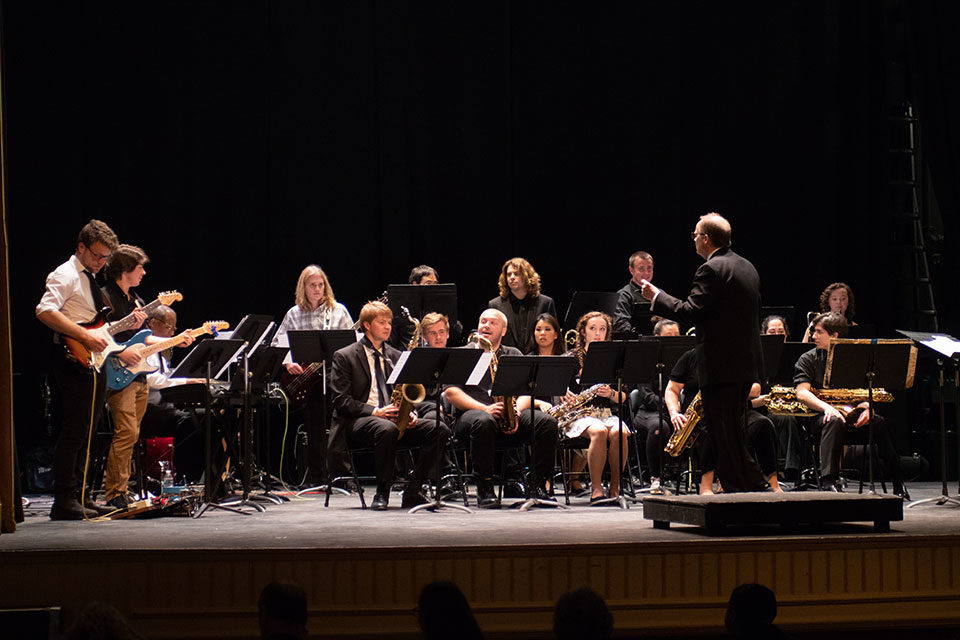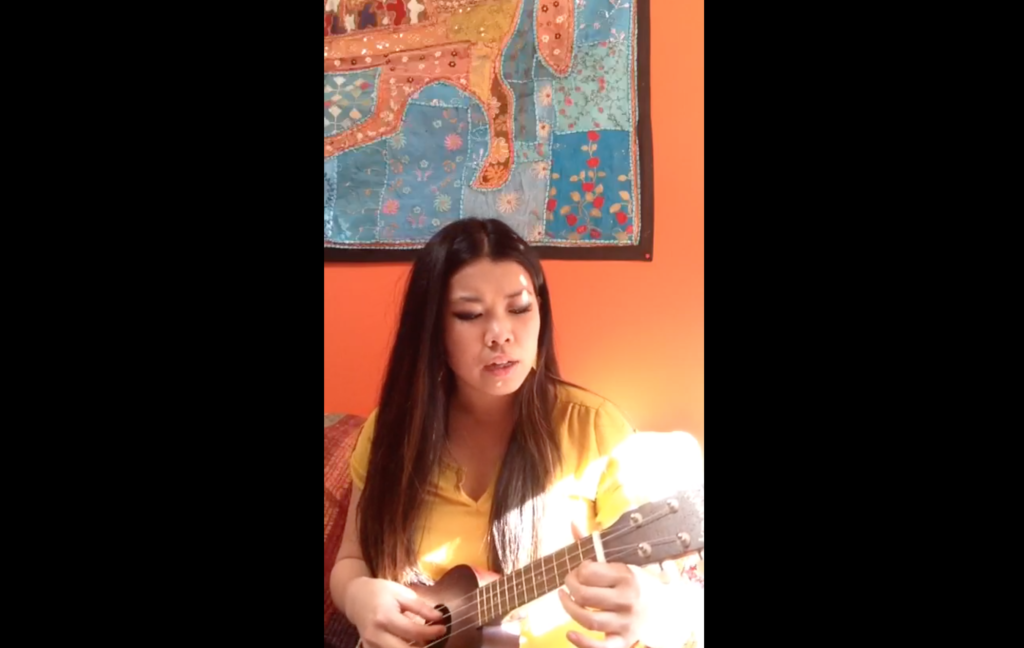Program Spotlight: How is the music program responding to remote learning?

As the world stays home, many people are turning to music to help them cope. Music has a powerful way of bringing people together — including Salve Regina. And while the music program here at the University has particular challenges due to remote learning, it’s using that creative power of music to help students navigate this difficult time.
Video: Katie Hurwitz ‘23 practices the cello at home in Walpole, Massachusetts.
Video: Bryce Sholtes ’20 practices at home in Newport, Rhode Island.
The music program has different categories of music education. There are typical classroom type courses like music theory and music history, which lay the foundations of a musical education; individual music instruction classes, such as private instruction on a particular instrument; and larger group educational experiences, such as musical ensembles that perform together in concerts.
So how is the music program handling each of these educational requirements for undergraduates while dealing with a pandemic?
Using ukuleles at home for music theory
For classes such as music theory, the classroom has moved pretty seamlessly online, which is due to the fact that classes can be mainly straightforward lecturing and learning through online platforms like Zoom or WebEx. Students are being asked to record themselves and do written assignments as well as sightseeing assignments based on whatever it is that they’re learning.
One challenge for things like core music theory classes, according to Peter Davis, senior lecturer of music and chairman of the Department of Music, Theater and Dance, is that many students in these classes might not have access to a piano at home. However, every single student in Essentials of Music Theory has been loaned a ukulele.
“They’re learning how to read music, play chords, supply harmony on the ukulele,” said Davis. “I’m teaching them rhythm, note reading and harmonies. So they have written assignments in this class, but they’re also sending video recordings of themselves playing either melodies or chord progressions on the ukulele. So that’s working very well for that class.”
Katie Hurwitz ‘23, a double major in elementary education and music, with a minor in creative writing, is in Davis’ music theory classes. While Hurwitz admitted that learning remotely is not the same as being in person and lamented the fact that the situation had to happen, she has also seen how some classes have used remote learning in an efficient way to streamline learning – including music theory.
“Professor Peter Davis can share his screen, so we can all see him doing examples of four-part voice writing,” she described. “Once we scan our completed assignments and upload them onto Canvas, he has the ability to annotate our scanned homework and tell us what to fix so we can hand it in again after understanding our mistakes. In this way, online learning has led to more individualization in teaching, which I value as a student.”
Individual music instruction & performing ensembles
For individual music instruction, it has been a pretty easy jump to online using platforms such as Zoom, Facetime and WebEx, according to the preference of the professor. Professors are watching the students play their instruments and offering live instruction to students through the comfort of computers all across the country.
Video: Hurwitz practices her cello with online instruction.
However, depending on the size of a performing ensemble and the complexity of music being performed, all of these factors can be a challenge for the effectiveness of online teaching for groups.
“We’re actually making some pretty good strides,” described Dr. Don St. Jean, associate professor of music and instructor for the madrigals chorus and university chorus. “I send a PDF of the music that we have been working on this semester … to people at each rehearsal, and they pull it up on their screen, and then we sing along with a recording of either the piano part only or with a [recorded] chorus.”
Ensembles are also experimenting with apps like the one called Acapella. In this app, people can stack recordings of different musical parts together to make a cohesive group recording while being thousands of miles apart. A person records a part and then passes it on to another person, and the recordings get layered together.
“Everyone records their parts at home, and we’re putting it all together,” described Bryce Sholtes ’20, a double major in music performance and political science with a minor in philosophy. “We’re working on these projects where we come together as a community, and that always feel especially important right now when we’re all so isolated: to be able to come together and work on something as a group.”
Video: The music department is experimenting with things like Acapella to do group musical projects.
A significant part of the music program are recitals and concerts, especially for graduating seniors like Sholtes. While some concerts for ensembles have had to move to the fall of 2020, the music program is figuring out what to do for seniors who must perform a recital in order to graduate. Sholtes himself is leaning towards performing a recital through Zoom at this point.
The power of music to heal during hard moments
Overall, while there are numerous hardships and struggles to being so isolated, those who are part of the music program believe that music can heal and help during such a hard time.
“It’s a therapeutic type of fulfillment,” said Dr. St. Jean. “It helps you to heal as a person, and I think for a lot of our students, that has been sort of a saving grace .…. It’s something to distract you … from such ominous news that we are hearing.”
Students Sholtes and Hurwitz agree with this. They know that having the ability to immerse themselves in music is a healing act no matter what else is going on, and that music can be a very calming outlet to practice, perform and listen to while they are dealing with a very uncertain time of life.
“One of the nice things is that music is one of the few things that when you’re really dedicating yourself to it, it’s the only thing that’s on your mind,” Sholtes explained. “And so it’s nice to have that mental escape.”
Video: Bryce Sholtes ’20 loses himself in the healing aspects of simply playing music.
Hurwitz added to this idea. “Music is a universal language that can at many times be more powerful than language itself,” she said. “I know that my emotions have been in a turbulent state lately, because not only am I sad about my own situation, but somehow I feel the weight of all of humanity suffering …. Playing music helps me express many feelings that I cannot express in just words.”
While nothing is ideal about the current situation, there has been so much meaning in coming together and expressing themselves in the music program — for both professors and students.
Check out stories every Tuesday that showcase the world of academics at Salve Regina and how faculty, programs and students are innovating with remote living and learning during Virtual Salve. #academictuesdays #salvesgotthis


